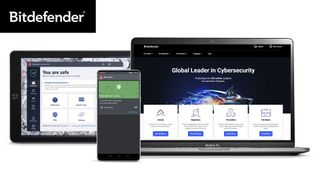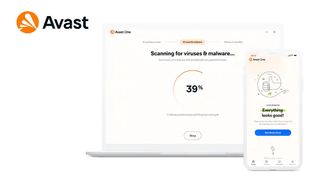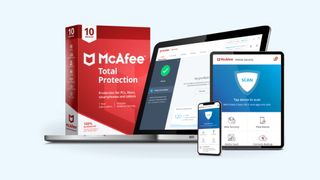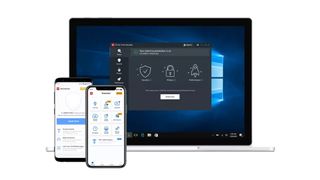Internet security suites offer core antivirus defenses for the devices of you and your family. Covering PC, Macs, Android and iOS in one easy-to-manage package, getting one means you don’t have to worry about organizing separate virus protection for each one of them.
Alongside this, the best internet security suites throw in additional tools and features that you usually won’t find in a basic plan; features like a bundled VPN, password manager (although you still might want to use the best password manager instead), rescue disks, secure file vaults for your sensitive data, and a secure browser for online banking and shopping.
So, there are some good reasons to consider grabbing a security suite, but if you decide to take this route, which one should you go for? With this in mind, we’ll go through and rank the best products, while discussing their individual and relative merits to help you make a more informed buying decision.
The best internet security suites 2023
Why you can trust TechRadar
We spend hours testing every product or service we review, so you can be sure you’re buying the best. Find out more about how we test.
Bitdefender Total Security is the well-respected security firm’s top-of-the-range package and tops the lot when it comes to all-singing all-dancing internet security suites.
Total Security is a suite that’s positively bristling with features. You get – deep breath – standard antivirus tools plus impressively capable multi-layered ransomware protection, a firewall, a Wi-Fi security advisor, a secure browser (Safepay) for online banking, a file shredder, a vulnerability scanner (to check for missing apps and OS updates), password manager, email spam filter, parental controls, webcam and microphone defenses, and more besides including a superb web protection module for blocking malicious URLs.
As well as security features, Total Security provides various PC maintenance and optimization tools. These are somewhat useful in themselves, for cleaning out superfluous files and streamlining boot times – but more importantly, Bitdefender’s flagship package also covers more than just Windows devices.
In fact, an app is provided for Mac users (this software is now compatible with M1 Macs, and has been improved to run faster virus scans), as well as clients for iOS and Android mobiles. The Android app has been revamped, and now has the capability to block more link-based mobile threats.
As it’s only a bit more expensive than Bitdefender Internet Security – the firm’s mid-tier security suite – it’s certainly worthwhile upgrading to Total Security if you have multiple devices across various platforms to protect. (You can see what we think of the range in our full Bitdefender review).
There is further good news in that Bitdefender has a minimal impact on system performance, going by independent and our own testing (some rivals do a touch better in this department, but it’s not a difference you’ll ever notice in real-world use).
Finally, it’s worth noting that there’s a 30-day trial of this suite, with no payment details needed; you just have to supply an email address. That means you can try out Bitdefender for a full month before committing to buying and see first-hand for yourself exactly what’s on offer here.
When we evaluated all of NortonLifeLock’s security suite options, we picked out Norton 360 Deluxe as the best value all-around choice for anyone who’s looking to protect more than a single device – which is likely the majority of folks.
Norton delivers good basic protection – although some of the independent test lab results have been a little mixed – alongside a wealth of features, including webcam protection and dark web monitoring (for users in the US, Canada, UK, Australia and a few other countries), an impressively smart firewall, plus a system of parental controls.
The parental controls are top-notch, by the way, including in-depth monitoring systems to keep an eye on what your kids are doing online, and even GPS tracking for their mobile devices. Norton’s very strong in this department.
There are some truly worthwhile extras included here, too, like a fully integrated Norton VPN that massively adds to the value proposition of this suite (assuming you don’t have a VPN already, of course), and 50GB of online backup storage that’s another handy bonus.
As for negative points, a flaw worth bearing in mind is that we found Norton 360 Deluxe had more of a drag on system performance than most internet security suites in our own testing. That said, it’s rated as about average in this department by independent test lab AV-Comparatives, and odds are you likely won’t even notice any impact on the speed of your system in everyday usage.
Norton 360 Deluxe covers up to five devices, either Windows or Mac PCs, plus there are mobile apps for Android and iOS. Pricing is highly competitive compared to rivals, particularly given that bundled VPN, so you should definitely consider this Norton package (compare it to the company’s other offerings with our guide to choosing your Norton plan) – especially for family usage with those very thorough parental controls.
Avast One is the trusted security outfit’s revamped suite which offers an umbrella of protection across various bases. That means not just antivirus and ransomware defenses, but also a firewall, webcam protection, data breach monitoring, and a software updater to keep apps patched up with no need for user intervention.
On top of that, Avast One provides a full VPN (with unlimited data – although it’s not the fastest we’ve ever seen, by any means), and some device speed-up and maintenance tools.
There are also some more unusual features like a Sensitive Data Shield which scans drives for files that may contain sensitive info like passwords and phone numbers and stops other users of a device from accessing these. In short, you get a lot with the paid subscription of Avast One (there’s a free version which is impressive, too, but it drops a number of features, and the VPN function is limited).
All this is wrapped up in a smart and easy-to-use interface which has been thoughtfully redesigned for Avast One, and the cherry on top is the strength of the protection delivered. Avast’s antivirus engine is rated as excellent by the independent test labs, and its web protection is among the best around, too. Furthermore, system slowdown is negligible when running this suite.
Overall, Avast One packs in a lot of features, and while some of these capabilities may not be as robust as the top performers in this roundup, the sheer weight of what you’re getting means this is one of the best all-rounders out there.
There’s a lot to like about Trend Micro’s flagship security suite – Trend Micro Maximum Security – not the least of which is its polished and user-friendly interface, backed up by superb virus protection. Trend Micro is highly ranked by the independent testing labs, and it offers sterling multi-layered anti-ransomware defenses, too.
The package also gives you first-class URL filtering for safer web browsing, further bolstering the overall defenses provided here. That said, one slight weak point with Trend Micro’s offering is that there isn’t a huge amount of low-level control – such as virus scan options – so more demanding users may find it lacking here.
Maximum Security provides parental controls, social media privacy features and PC maintenance tools, although the latter isn’t its strongest suit. It also boasts data theft prevention countermeasures, a secure vault for storing sensitive files, and a decent integrated password manager.
Less tech-savvy types will appreciate the ease-of-use here, which also goes for the capable mobile apps. There’s a 30-day trial as well, so you can thoroughly check all this out for yourself before pulling the trigger on a purchase.
As the name suggests, McAfee’s basic security product, Total Protection Individual, only covers one individual device. And if you’re thinking of buying that, and you own more than just a Windows PC, then you’re almost certainly better off purchasing McAfee Total Protection Multi-Device.
For not much more money at all you get a sound internet security suite which protects up to five Windows or Mac computers, and Android or iOS devices. US customers also benefit from a useful additional extra in the form of identity theft protection.
McAfee’s interface is simple and streamlined, which keeps things easy for beginners, although it’ll likely be too sparse for more experienced users. The UI also suffers from some annoying quirks, but nothing too frustrating.
Independent test lab reports suggest McAfee Total Protection offers solid enough defenses, if not class-leading. Indeed, evaluations of McAfee’s antivirus engine vary, with some being more scathing than others.
Overall, McAfee’s suite represents reasonable value and a decent choice in the Multi-Device package, with some nifty extras for boosting web browsing and app performance, plus an integrated (but very basic) free VPN that’s commendably user-friendly.
Another security suite worth considering is one from BullGuard, which offers multi-layered defenses backed by advanced machine learning to stop current and future malware threats.
Additionally there’s a built-in firewall, vulnerability scanner, and a home network scanner for ensuring your Wi-Fi connection is safe and secure.
BullGuard Premium Protection also gives gamers a treat with its Game Booster optimization feature, which is designed to improve performance while gaming (and it works well enough, by all accounts).
BullGuard provides a good quality engine, or at least it’s rated highly by AV-Test, the one independent test lab which covers the security firm. Furthermore, BullGuard Premium Protection represents a solid value proposition for those looking to cover many devices. In fact, if you need to protect 10+ devices, it actually works out cheaper than BullGuard’s Internet Security suite which has fewer features – an odd situation, but not one we’ll argue with!
This is an interesting one in that Avira’s top-level package is missing some of the core security features you might find in other internet security suites, but it more than makes up for this in other ways which might be tempting depending on your own personal needs and use case.
So, while a firewall and parental controls might be missing from Avira Prime – or a backup facility (save for a contacts backup feature on the iOS app) – you do get some nifty stuff instead. That includes a decent VPN and some seriously high-quality PC maintenance tools.
If you want those speed-up tools, and/or have been considering getting a VPN as well as a new security suite, then Prime could be a perfect fit. In fact, in the latter case, Avira Prime works out as storming value for money, providing a solid engine to keep you safe, and that Avira VPN on top to keep you safer still online. Others, however, may miss the aforementioned core suite features like parental controls, of course.
ESET Smart Security Premium packs in a lot of features including parental controls, webcam protection, network monitoring, additional network protection, and an anti-theft feature for Windows devices allowing for location tracking is an interesting bonus. Furthermore, Linux systems are covered here, as well as Windows and Mac computers.
However, while ESET delivers lots of features, their quality can be variable. For example, the system of parental controls is very barebones, but the password manager is well fleshed out. ESET also offers plenty of configuration options, which will please experts, although computing novices may find it tricky to get to grips with in some respects.
ESET’s antivirus protection seems solid, albeit with some mixed evaluations from independent testing labs. It’s also worth noting that the suite’s defenses have recently been bolstered with Live Guard, an extra layer of cloud analysis to detect newly emerged threats.
Smart Security Premium provides some interesting extras, too, including the aforementioned password manager, and a secure, encrypted file vault to protect any sensitive data on your PC, which some folks will doubtless find very useful additions.
That said, unless you really want this additional functionality, it’s not the best value for money internet security suite out there.
Webroot majors in being incredibly lightweight and fast-performing. Indeed, it has a minuscule memory footprint, and takes up next to no space on your system drive, as the product’s virus definitions are all stored in the cloud.
Yet despite this minimal impact on your machine, Webroot Internet Security Plus comes with plenty of features. There’s online banking protection, an Identity Shield to prevent data theft from the likes of keyloggers, ransomware defenses, an accurate anti-phishing system, a smart firewall, plus a password manager as you get a LastPass subscription bundled.
Downsides? Well, you might get lightning quick malware scans, but Webroot hasn’t fared very well in recent antivirus testing by the independent labs (or at least one of them, as the other big players don’t evaluate this product). The accuracy of its engine is mixed at best, so that’s a somewhat worrying question mark at the time of writing.
Still, Internet Security Plus is a well-rounded package, and as we pointed out in our review, Windows users could always run it alongside the free Microsoft Defender to get the benefit of Webroot’s bonus features, while doubling up on protection. The company’s 70-day ‘no questions asked’ money-back guarantee is also noteworthy, showing Webroot’s confidence in its suite.
Editors note: Kaspersky Total Security Anti-Virus used to appear on this list. Considering the current climate however, we’ve taken the decision to remove the provider. Although much of the company’s core processes are now take place in Switzerland, the fact that its headquarters remain in Moscow and there have been previous allegations around government coercion, it feels prudent to use the provider with caution. And, when there are so many other excellent providers to choose from, it’s impossible to whole-heartedly recommend Kaspersky at this time.
Internet security suites FAQ
What is the best internet security suite for 2022?
While there are excellent internet security suites out there from names such as Norton, Kaspersky and Trend Micro, we think Bitdefender Total Security is the best you can get right now.
Available to use on up to 10 devices (including Windows, Macs, Android and iOS) Total Security combines super string virus protection with numerous extra features that genuinely add value to the package.
For example, a single subscription includes ransomware protection, firewall, Wi-Fi security advisor, secure browser. file shredder, vulnerability scanner, password manager, email spam filter, parental controls, webcam, microphone defenses and more!
It’s also really easy to set up and use, while not even being that expensive.
What should I look for in an internet security suite?
All of the products on this list offer effective capabilities, so the difference is in additional capabilities. If there is a particular type of threat that concerns you, such as ransomware or phishing, check to see if there are specific protections included.
Banking safeguards, firewalls and parental controls are also areas you should consider – especially if there are multiple users on your computer. And of course, you should consider whether you need protection across multiple devices, such as smartphones.
The number of additional features and devices may impact cost though.
Finally, think about usability and the impact on system performance. Do you want a high level of customization or do you want an easy-to-use interface and do you want a program that is capable of fast scans or one that requires minimal system resources?
Do I really need an internet security suite?
It’s certainly true that a good entry-level antivirus will deliver strong core defenses against malware, so why would you want to think about getting one of the best internet security suites?
After all, don’t all apps from the same vendor use the exact same antivirus engine, giving you the same fundamental protection – while a suite demands a heftier price tag?
Of course, you’ll get more features with internet security suites, but one perception is that these maybe aren’t all that critical to protect your device. And in some cases, this is true; they’re just nice extras to have.
But in other cases, you might get capabilities like secure file vaults for your sensitive data, or a secure browser with which to engage in the likes of online banking – all of which provide worthwhile additional safeguards. Then there are elements like a password manger, or bundled VPN, which again really bolster online security beyond core measures, if you don’t already have these things.
Features like a free VPN could add to the value proposition of an internet security suite in a big way – depending on your existing software and needs – and while we mentioned paying more for a suite compared to a basic antivirus, sometimes security vendors don’t charge much more. Indeed, when deals and discounts come into play, it can be the case that there’s barely any difference in price – and don’t forget, internet security suites usually support a fair few more devices (which can be a major consideration if you need coverage for family members as well as yourself).
What’s the difference between antivirus and internet security suites?
Whereas antivirus software provides a basic level of protection for your system, full internet security expands on capabilities such as scanning files and software, activity monitoring and vulnerability search with features tailored for Internet use.
Indeed, many internet security products are marketed as ‘suites’ because they contain several different programs that can be accessed by a single interface.
These might include a firewall, anti-spam controls, ad blockers, webcam protection, keylogger protection, parental controls and credit card safeguards. There might also be additional protection against web-specific types of malware such as spyware and adware.
However running so many different types of program might mean that internet security suites use more of your system resources than conventional AV.
Can I create my own free internet security suite?
There are many advantages to purchasing a premium internet security suite from a trusted vendor, but it is perfectly possible to create your own modular suite by picking the most suitable free products.
While this might mean you save money, it does mean you have to do much of the work yourself. You will have to identify the best components, whether its virus protection, firewall or backup software, and fix any problems yourself.
The more components you introduce will increase complexity and system resource use. You will also suffer from the pitfalls of using free services such as frequent adverts urging you to upgrade.
Using a premium internet security suite means the vendor integrates several services into a single package that can be managed from a single interface. What’s more, they might cover several different types of device and offer different tiers of protection.
If you do want to build out your own suite, then you can pick the best of individual components in the following advice guides:
– rescue disk
– encryption software
– privacy
– firewall
– cloud antivirus
– endpoint protection
– online cyber security courses






















